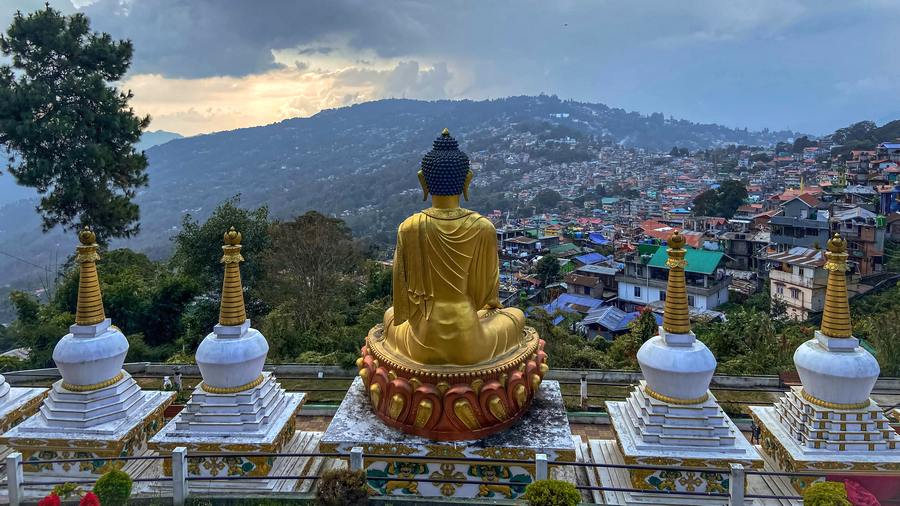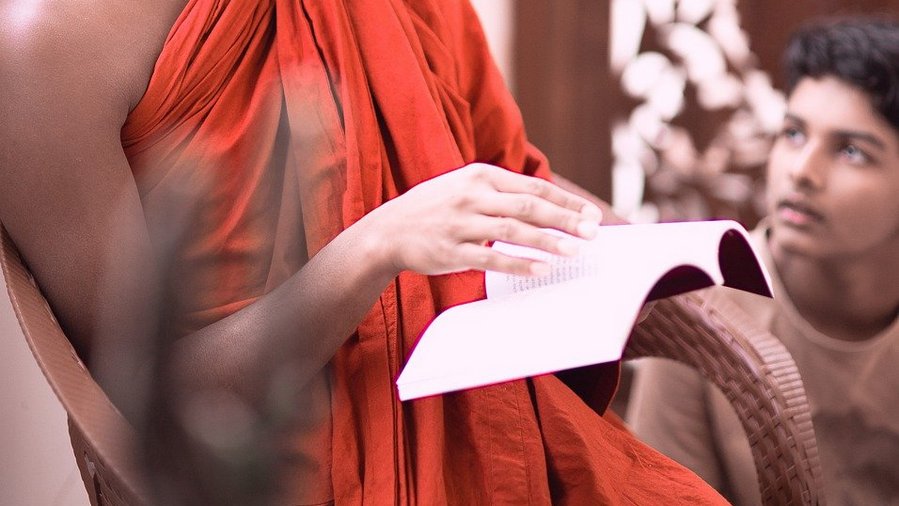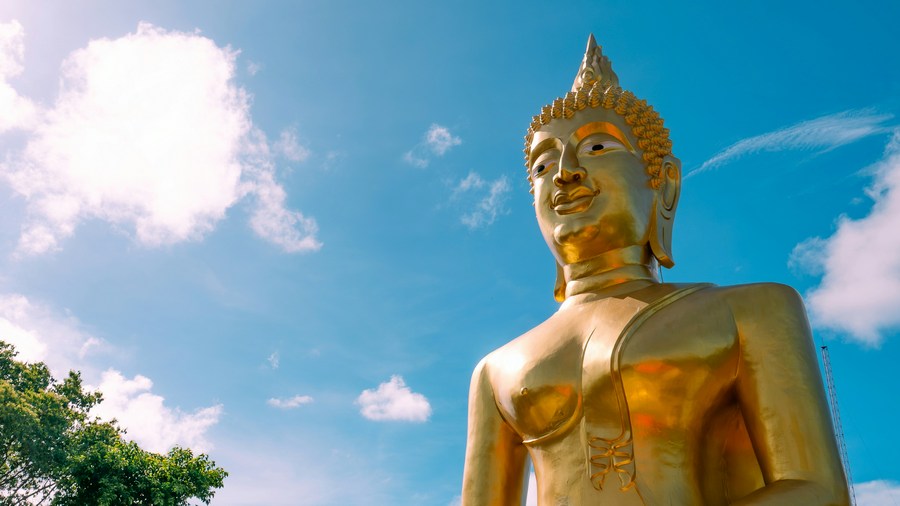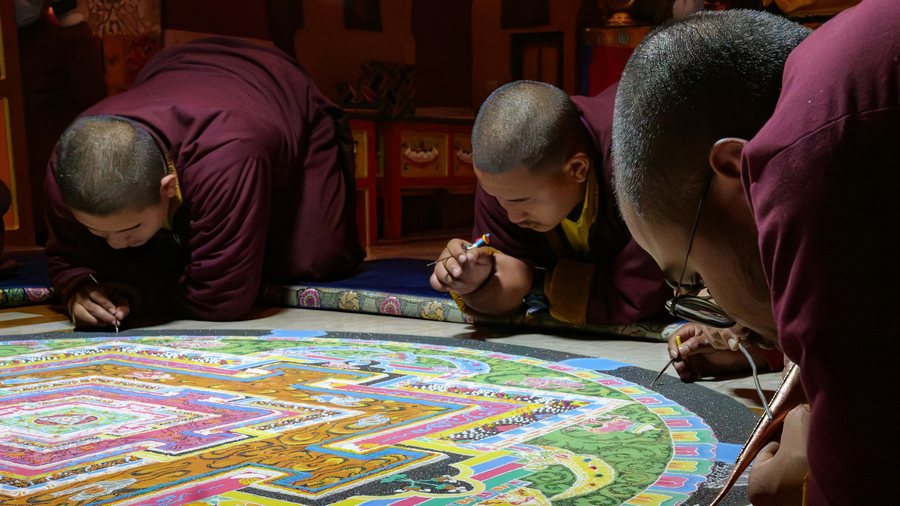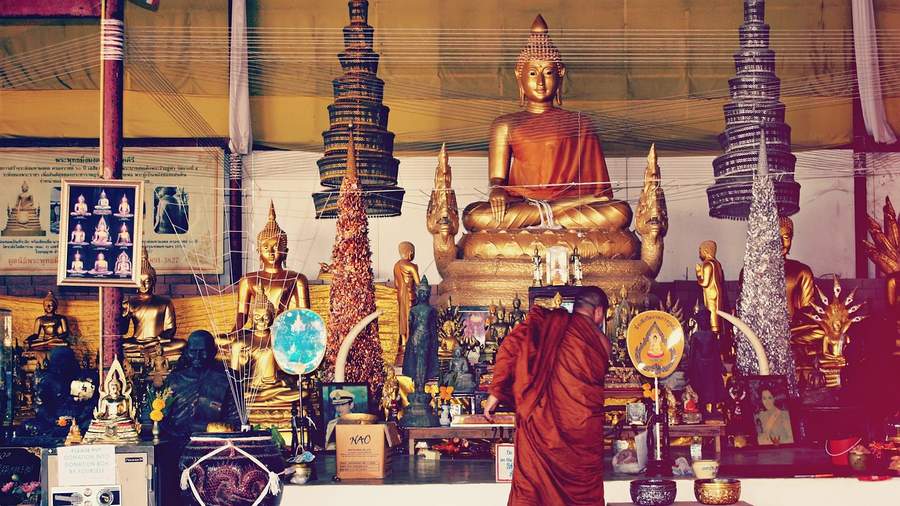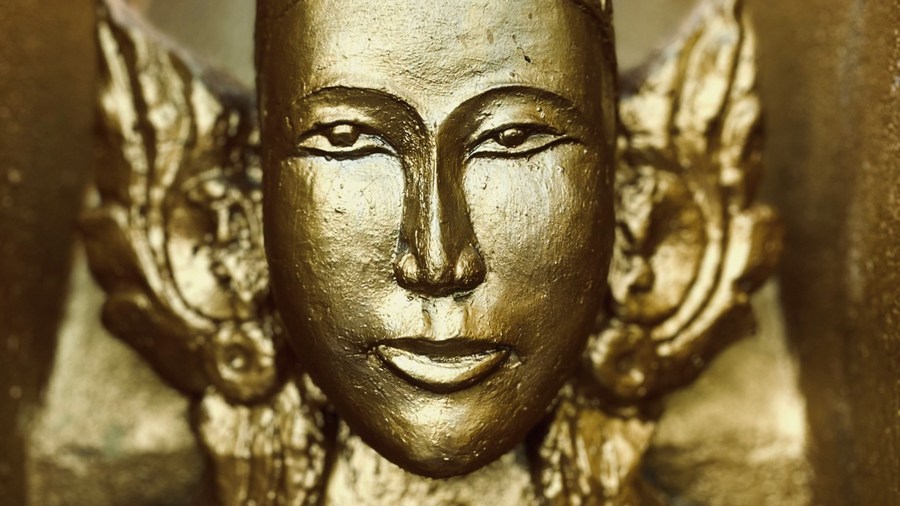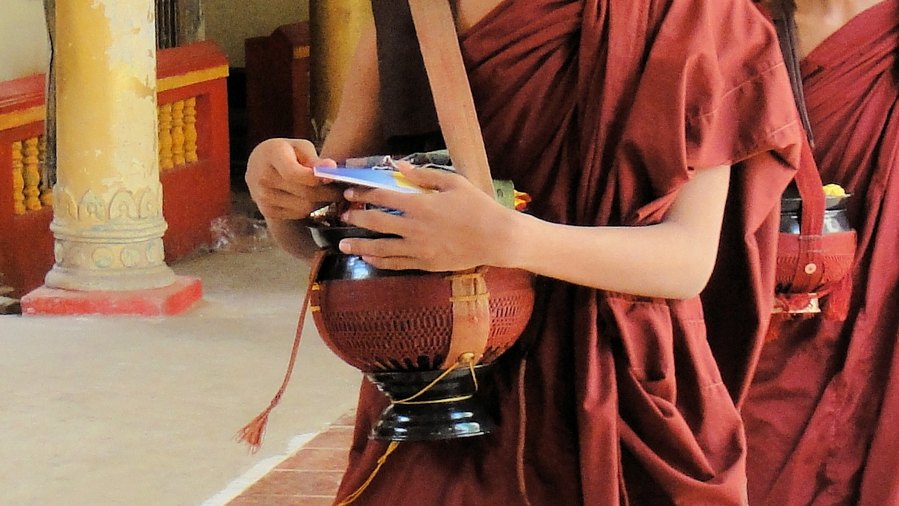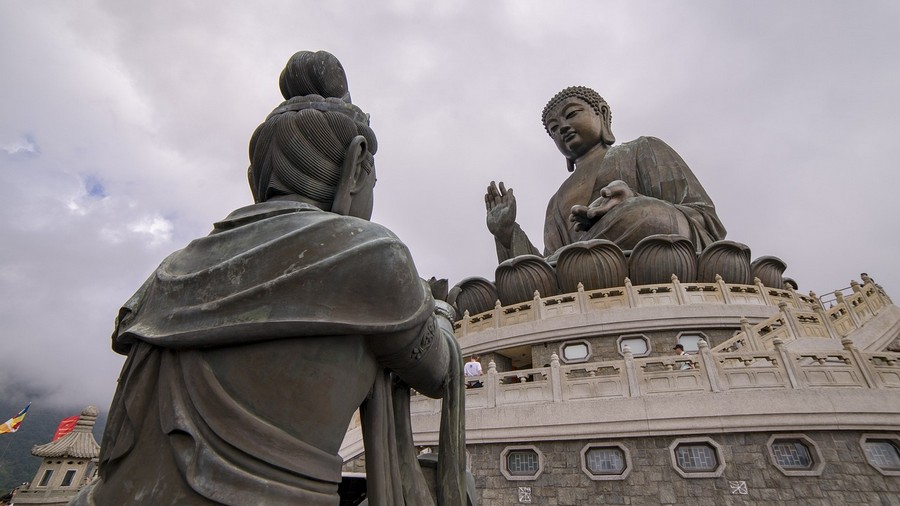[Note: This is a long selection from a much, much longer sutta. If you have time it would be good to read the whole thing. The sutta begins with the wanderer Sakuludayin recounting his experience with other teachers. Below he begins to speak about the Buddha.]
“…And some said this: ‘This recluse Gotama is the head of an order, the head of a group, the teacher of a group, the well-known and famous founder of a sect regarded by many as a saint. He is honoured, respected, revered, and venerated by his disciples, and his disciples live in dependence on him, honouring and respecting him. Once the recluse Gotama was teaching his Dhamma to an assembly of several hundred followers and there a certain disciple of his cleared his throat. Thereupon one of his companions in the holy life nudged him with his knee to indicate: “Be quiet, venerable sir, make no noise; the Blessed One, the Teacher, is teaching us the Dhamma.” When the recluse Gotama is teaching the Dhamma to an assembly of several hundred followers, on that occasion there is no sound of his disciples’ coughing or clearing their throats. For then that large assembly is poised in expectancy: “Let us hear the Dhamma the Blessed One is about to teach.” Just as though a man were at a crossroads pressing out pure honey and a large group of people were poised in expectancy, so too, when the recluse Gotama is teaching the Dhamma to an assembly of several hundred followers, on that occasion there is no sound of his disciples’ coughing or clearing their throats. For then that large assembly is poised in expectancy: “Let us hear the Dhamma the Blessed One is about to teach.” And even those disciples of his who fall out with their companions in the holy life and abandon the training to return to the low life—even they praise the Master and the Dhamma and the Sangha; they blame themselves instead of others, saying: “We were unlucky, we have little merit; for though we went forth into homelessness in such a well-proclaimed Dhamma, we were unable to live the perfect and pure holy life for the rest of our lives.” Having become monastery attendants or lay followers, they undertake and observe the five precepts. Thus the recluse Gotama is honoured, respected, revered, and venerated by his disciples, and his disciples live in dependence on him, honouring and respecting him.’”
“But, Udāyin, how many qualities do you see in me because of which my disciples honour, respect, revere, and venerate me, and live in dependence on me, honouring and respecting me?”
“Venerable sir, I see five qualities in the Blessed One because of which his disciples honour, respect, revere, and venerate him, and live in dependence on him, honouring and respecting him. What are the five? First, venerable sir, the Blessed One eats little and commends eating little; this I see as the first quality of the Blessed One because of which his disciples honour, respect, revere, and venerate him, and live in dependence on him, honouring and respecting him. Again, venerable sir, the Blessed One is content with any kind of robe and commends contentment with any kind of robe; this I see as the second quality of the Blessed One…Again, venerable sir, the Blessed One is content with any kind of almsfood and commends contentment with any kind of almsfood; this I see as the third quality of the Blessed One…Again, venerable sir, the Blessed One is content with any kind of resting place and commends contentment with any kind of resting place; this I see as the fourth quality of the Blessed One…Again, venerable sir, the Blessed One is secluded and commends seclusion; this I see as the fifth quality of the Blessed One…Venerable sir, these are the five qualities I see in the Blessed One because of which his disciples honour, respect, revere, and venerate him, and live in dependence on him, honouring and respecting him.”
“Suppose, Udāyin, my disciples honoured, respected, revered, and venerated me, and lived in dependence on me, honouring and respecting me, with the thought: ‘The recluse Gotama eats little and commends eating little.’ Now there are disciples of mine who live on a cupful or half a cupful of food, a bilva fruit’s or half a bilva fruit’s quantity of food, while I sometimes eat the full contents of my almsbowl or even more. So if my disciples honoured me…with the thought: ‘The recluse Gotama eats little and commends eating little,’ then those disciples of mine who live on a cupful of food…should not honour, respect, revere, and venerate me for this quality, nor should they live in dependence on me, honouring and respecting me.
“Suppose, Udāyin, my disciples honoured, respected, revered, and venerated me, and lived in dependence on me, honouring and respecting me, with the thought: ‘The recluse Gotama is content with any kind of robe and commends contentment with any kind of robe.’ Now there are disciples of mine who are refuse-rag wearers, wearers of coarse robes; they collect rags from the charnel ground, rubbish heaps, or shops, make them into patched robes, and wear them. But I sometimes wear robes given by householders, robes so fine that pumpkin hair is coarse in comparison. So if my disciples honoured me…with the thought: ‘The recluse Gotama is content with any kind of robe and commends contentment with any kind of robe,’ then those disciples of mine who are refuse-rag wearers, wearers of coarse robes…should not honour, respect, revere, and venerate me for this quality, nor should they live in dependence on me, honouring and respecting me.
“Suppose, Udāyin, my disciples honoured, respected, revered, and venerated me, and lived in dependence on me, honouring and respecting me, with the thought: ‘The recluse Gotama is content with any kind of almsfood and commends contentment with any kind of almsfood.’ Now there are disciples of mine who are almsfood eaters, who go on unbroken almsround from house to house, who delight in gathering their food; when they have entered among the houses they will not consent even when invited to sit down. But I sometimes eat on invitation meals of choice rice and many sauces and curries. So if my disciples honoured me…with the thought: ‘The recluse Gotama is content with any kind of almsfood and commends contentment with any kind of almsfood,’ then those disciples of mine who are almsfood eaters…should not honour, respect, revere, and venerate me for this quality, nor should they live in dependence on me, honouring and respecting me.
“Suppose, Udāyin, my disciples honoured, respected, revered, and venerated me, and lived in dependence on me, honouring and respecting me, with the thought: ‘The recluse Gotama is content with any kind of resting place and commends contentment with any kind of resting place.’ Now there are disciples of mine who are tree-root dwellers and open-air dwellers, who do not use a roof for eight months of the year, while I sometimes live in gabled mansions plastered within and without, protected against the wind, secured by door bolts, with shuttered windows. So if my disciples honoured me…with the thought: ‘The recluse Gotama is content with any kind of resting place and commends contentment with any kind of resting place,’ then those disciples of mine who are tree-root dwellers and open-air dwellers…should not honour, respect, revere, and venerate me for this quality, nor should they live in dependence on me, honouring and respecting me.
“Suppose, Udāyin, my disciples honoured, respected, revered, and venerated me, and lived in dependence on me, honouring and respecting me, with the thought: ‘The recluse Gotama is secluded and commends seclusion.’ Now there are disciples of mine who are forest dwellers, dwellers in remote resting places, who live withdrawn in remote jungle-thicket resting places and return to the midst of the Sangha once each half-month for the recitation of the Pātimokkha. But I sometimes live surrounded by bhikkhus and bhikkhunīs, by men and women lay followers, by kings and kings’ ministers, by other sectarians and their disciples. So if my disciples honoured me…with the thought: ‘The recluse Gotama is secluded and commends seclusion,’ then those disciples of mine who are forest dwellers…should not honour, respect, revere, and venerate me for this quality, nor should they live in dependence on me, honouring and respecting me. Thus, Udāyin, it is not because of these five qualities that my disciples honour, respect, revere, and venerate me, and live in dependence on me, honouring and respecting me.
“However, Udāyin, there are five other qualities because of which my disciples honour, respect, revere, and venerate me, and live in dependence on me, honouring and respecting me. What are the five?
i. The Higher Virtue
“Here, Udāyin, my disciples esteem me for the higher virtue thus: ‘The recluse Gotama is virtuous, he possesses the supreme aggregate of virtue.’ This is the first quality because of which my disciples honour, respect, revere, and venerate me, and live in dependence on me, honouring and respecting me.
ii. Knowledge and Vision
“Again, Udāyin, my disciples esteem me for my excellent knowledge and vision thus: ‘When the recluse Gotama says “I know,” he truly knows; when he says “I see,” he truly sees. The recluse Gotama teaches the Dhamma through direct knowledge, not without direct knowledge; he teaches the Dhamma with a sound basis, not without a sound basis; he teaches the Dhamma in a convincing manner, not in an unconvincing manner.’ This is the second quality because of which my disciples honour me…
iii. The Higher Wisdom
“Again, Udāyin, my disciples esteem me for the higher wisdom thus: ‘The recluse Gotama is wise; he possesses the supreme aggregate of wisdom. It is impossible that he should not foresee the implications of an assertion or that he should not be able to confute with reasons the current doctrines of others.’ What do you think, Udāyin? Would my disciples, knowing and seeing thus, break in and interrupt me?”—“No, venerable sir.”—“I do not expect instruction from my disciples; invariably, it is my disciples who expect instruction from me. This is the third quality because of which my disciples honour me…
iv. The Four Noble Truths
“Again, Udāyin, when my disciples have met with suffering and become victims of suffering, prey to suffering, they come to me and ask me about the noble truth of suffering. Being asked, I explain to them the noble truth of suffering, and I satisfy their minds with my explanation. They ask me about the noble truth of the origin of suffering…about the noble truth of the cessation of suffering…about the noble truth of the way leading to the cessation of suffering. Being asked, I explain to them the noble truth of the way leading to the cessation of suffering, and I satisfy their minds with my explanation. This is the fourth quality because of which my disciples honour me…
V. The Way to Develop Wholesome States
1. The Four Foundations of Mindfulness
“Again, Udāyin, I have proclaimed to my disciples the way to develop the four foundations of mindfulness. Here a bhikkhu abides contemplating the body as a body, ardent, fully aware, and mindful, having put away covetousness and grief for the world. He abides contemplating feelings as feelings…He abides contemplating mind as mind…He abides contemplating mind-objects as mind-objects, ardent, fully aware, and mindful, having put away covetousness and grief for the world. And thereby many disciples of mine abide having reached the consummation and perfection of direct knowledge.
2. The Four Right Kinds of Striving
“Again, Udāyin, I have proclaimed to my disciples the way to develop the four right kinds of striving. Here a bhikkhu awakens zeal for the non-arising of unarisen evil unwholesome states, and he makes effort, arouses energy, exerts his mind, and strives. He awakens zeal for the abandoning of arisen evil unwholesome states…He awakens zeal for the arising of unarisen wholesome states…He awakens zeal for the continuance, non-disappearance, strengthening, increase, and fulfilment by development of arisen wholesome states, and he makes effort, arouses energy, exerts his mind, and strives. And thereby many disciples of mine abide having reached the consummation and perfection of direct knowledge.
3. The Four Bases for Spiritual Power
“Again, Udāyin, I have proclaimed to my disciples the way to develop the four bases for spiritual power. Here a bhikkhu develops the basis for spiritual power consisting in concentration due to zeal and determined striving. He develops the basis for spiritual power consisting in concentration due to energy and determined striving. He develops the basis for spiritual power consisting in concentration due to purity of mind and determined striving. He develops the basis for spiritual power consisting in concentration due to investigation and determined striving. And thereby many disciples of mine abide having reached the consummation and perfection of direct knowledge.
4. The Five Faculties
“Again, Udāyin, I have proclaimed to my disciples the way to develop the five spiritual faculties. Here a bhikkhu develops the faculty of faith, which leads to peace, leads to enlightenment. He develops the faculty of energy…the faculty of mindfulness… the faculty of concentration…the faculty of wisdom, which leads to peace, leads to enlightenment. And thereby many disciples of mine abide having reached the consummation and perfection of direct knowledge.
5. The Five Powers
“Again, Udāyin, I have proclaimed to my disciples the way to develop the five powers. Here a bhikkhu develops the power of faith, which leads to peace, leads to enlightenment. He develops the power of energy…the power of mindfulness…the power of concentration…the power of wisdom, which leads to peace, leads to enlightenment. And thereby many disciples of mine abide having reached the consummation and perfection of direct knowledge.
6. The Seven Enlightenment Factors
“Again, Udāyin, I have proclaimed to my disciples the way to develop the seven enlightenment factors. Here a bhikkhu develops the mindfulness enlightenment factor, which is supported by seclusion, dispassion, and cessation, and results in relinquishment. He develops the investigation-of-states enlightenment factor…the energy enlightenment factor…the rapture enlightenment factor…the tranquillity enlightenment factor… the concentration enlightenment factor…the equanimity enlightenment factor, which is supported by seclusion, dispassion, and cessation, and results in relinquishment. And thereby many disciples of mine abide having reached the consummation and perfection of direct knowledge.
7. The Noble Eightfold Path
“Again, Udāyin, I have proclaimed to my disciples the way to develop the Noble Eightfold Path. Here a bhikkhu develops right view, right intention, right speech, right action, right livelihood, right effort, right mindfulness, and right concentration. And thereby many disciples of mine abide having reached the consummation and perfection of direct knowledge.…
[The Buddha then goes on to explain the other things he has taught.]
Read the entire translation of Majjhima Nikāya 77 Mahāsakuludāyisutta: The Greater Discourse to Sakuludāyin by Bhikkhu Bodhi on SuttaCentral.net. Or read a different translation on SuttaCentral.net or DhammaTalks.org. Or listen on PaliAudio.com or SC-Voice.net. Or explore the Pali on DigitalPaliReader.online.
Or read a translation in Deutsch, Русский, বাংলা, Español, Français, हिन्दी, Magyar, Bahasa Indonesia, Italiano, 日本語, မြန်မာဘာသာ, Nederlands, Norsk, Português, සිංහල, Slovenščina, Srpski, ไทย, Tiếng Việt, or 汉语. Learn how to find your language.

 All translations on this site by Bhikkhu Bodhi are licensed under a Creative Commons Attribution-NonCommercial-NoDerivs 3.0 Unported License.
Bhikkhu Bodhi, The Middle Length Discourses of the Buddha (Wisdom Publications, 2009), The Connected Discourses of the Buddha (Wisdom Publications, 2000), The Numerical Discourses of the Buddha (Wisdom Publications, 2012).
All translations on this site by Bhikkhu Bodhi are licensed under a Creative Commons Attribution-NonCommercial-NoDerivs 3.0 Unported License.
Bhikkhu Bodhi, The Middle Length Discourses of the Buddha (Wisdom Publications, 2009), The Connected Discourses of the Buddha (Wisdom Publications, 2000), The Numerical Discourses of the Buddha (Wisdom Publications, 2012).